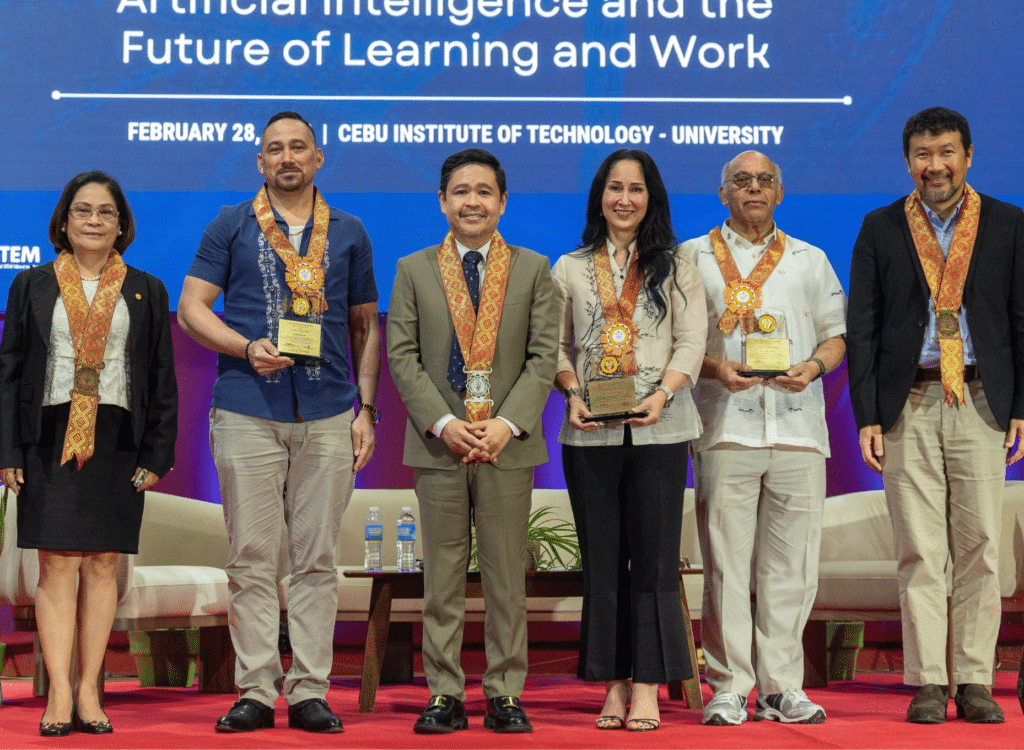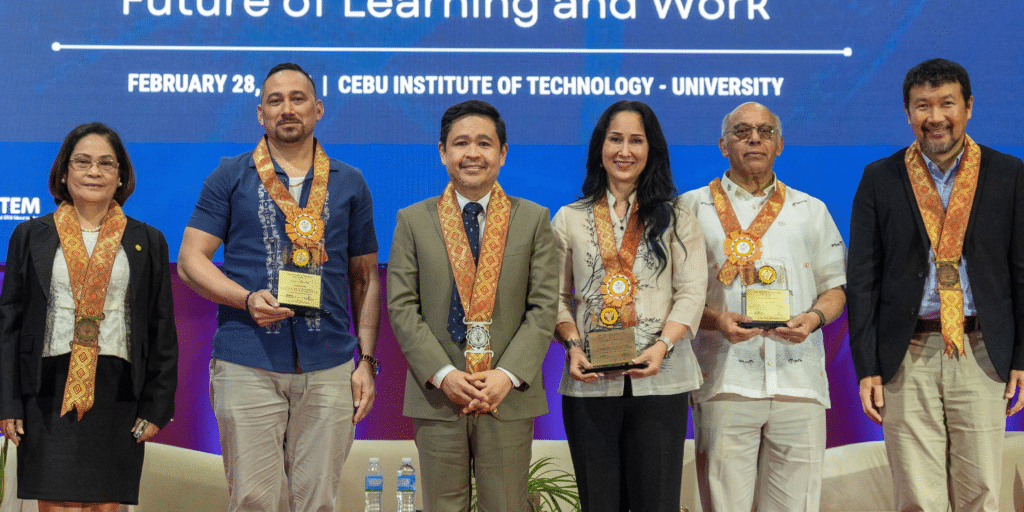Cebu Institute of Technology – University (CIT University) proudly hosted the Cebu leg of the “AI and Beyond: Artificial Intelligence and the Future of Learning and Work” symposium in partnership with Unilab Education (UniEd) and the Massachusetts Institute of Technology’s Responsible AI for Social Empowerment and Education (MIT RAISE) initiative.
Innovation is not just about technology—it’s about people, ideas, and impact.
ENGR. BERNARD NICOLAS E. VILLAMOR
CIT UNIVERSITY PRESIDENT
The event brought educators, industry partners, and students together to explore the transformative role of artificial intelligence (AI) in shaping education and workforce development.
CIT University: Ready for the AI-Powered Future

L-R: Atty. Corazon Evangelista-Valencia (CIT-U Vice President for Academic Affairs), Mr. John Radovan (MIT Open Learning Director of Public Sector Business Development), Engr. Bernard Nicolas E. Villamor (CIT-U President), Dr. Cynthia Breazeal (MIT Dean of Digital Learning and Director of MIT RAISE Initiative), Dr. Vijay Kumar (MIT Open Learning Senior Adviser to the Vice President); Mr. John Gregory B. Escario (CIT-U Vice President for Administration)
The event reinforced CIT University’s readiness and leadership in AI-powered learning environments. Known for its strong engineering and computing programs, CIT University is actively shaping the AI landscape in the Philippines through academic instruction, innovation, research, and industry collaboration.
In his welcome address, CIT University President Engr. Bernard Nicolas E. Villamor challenged attendees to envision how AI could eliminate everyday work and learning bottlenecks. He emphasized that AI is not a distant dream but a present-day tool for transformation, urging everyone to look at AI not as a threat but as a tool for empowerment.
“AI is not just an Automator—it is an amplifier of human potential,” Engr. Villamor said. “Technology doesn’t replace people—it empowers those who learn to use it.”
CIT University’s Innovation Ecosystem: Fostering Interdisciplinary Breakthroughs
CIT University’s reputation as a leader in AI is rooted in a robust and future-focused innovation ecosystem anchored on three core pillars:
- The CenteR for E-learning And Technology Education (CREATE)
CREATE has been pivotal in advancing AI-powered education. Its flagship innovation—an AI-assisted learning module—was developed to help faculty customize instruction and enhance content delivery. This groundbreaking work earned CIT University international recognition from the World’s Universities with Real Impact (WURI) Rankings under the AI Category.
The Center hosted the Robotics Cup even during the pandemic and conducted it online. The event aims to expose students from the elementary and high school departments to coding using a Scratch programming language and encourage senior high school students to present innovative solutions to problems our society faces.
CREATE also provides faculty development programs, policy support, and research mentorship in instructional technology and education innovation. In collaboration with various departments, CREATE conducted a 3-day event (AI empowerEd program), which began with exploring AI fundamentals, including applications in education, machine learning basics, natural language processing, computer vision, and ethical considerations. The CREATE-initiated program guided faculty through hands-on sessions, allowing them to experience AI tools directly. It actively bridges educational theory and digital transformation, enabling AI-enhanced content creation and responsive teaching strategies.
- AI Fabrication Laboratory (AI FabLab)
The AI FabLab is a state-of-the-art makerspace that enables hands-on AI research, prototyping, and problem-solving. Designed to equip students and researchers with Industry 4.0 competencies, the FabLab offers:
- Robotics and engineering-based collaborations including the Minebea Mitsumi Robotics Project and the CNC Milling Machine Precision System Upgrade;
- Novelty production services that create market-ready designs and customized event products;
- Seminars and certification programs to ensure that students are equipped with essential AI, IoT, and automation skills; and
- Membership in the international FABLAB network, providing global exposure and research collaboration opportunities.
In collaboration with Southern Taiwan University of Science and Technology, the AI FabLab and CIT-U Computer Science students developed Project SEER and TacPic, AI-driven assistive technologies combining engineering with social impact for the visually impaired. The FabLab also supervised the creation and development of the SWAN aquatic drone project of CIT-U Computer Engineering students for the Region 7 Coast Guard. As the first in the Philippines under the DTI Shared Service Facility (SSF) program, the AI FabLab specializes in AI and Creative design, applying AI and Machine Learning in different disciplines.
- Wildcat Innovation Lab (WIL)
WIL serves as CIT-U’s technopreneurship hub, offering a nurturing environment for startups, student innovators, and community-based solutions. With a 30-seat co-working space, a 14-seat conference room, a mini café, and a LaunchLab Pre-Acceleration Program, WIL empowers entrepreneurs to take AI-powered ideas from prototype to market.
Strategic collaborations with StellarPH, DTI-7, DOST-7, and DOST-PCIEERD have expanded startup funding pipelines. At the same time, WIL’s projects continue integrating AI in developing community-focused solutions, as CIT-U is creating a new wave of AI-powered entrepreneurs by combining AI and digital tools into startup incubation.
The College of Computer Studies: Excellence in AI, Research, and Competition
Over the last 15 years, CIT-U CCS faculty members have presented and published research related to AI and participated in national and international research conferences, including the latest 2025 International Symposium on Education, AI, and Cybersecurity (ISEAC), where the College has presented seven papers. These accomplishments show CIT-U’s continued leadership in cutting-edge AI academic contributions. These latest accomplishments are a testament to the College’s pursuit for excellence and alignment with global AI, computing, and digital innovation standards.
Looking Ahead: Leading the Charge in Responsible AI
With a commitment to technopreneurship, sustainable development, and community impact, the university continues to strengthen partnerships with global institutions and grassroots organizations.
“Innovation is not just about technology—it’s about people, ideas, and impact,” Engr. Villamor emphasized. “As educators and leaders, we must ensure that AI serves as a force for empowerment, fostering creativity, critical thinking, and lifelong learning with gainful employment.”
With the successful hosting of the Cebu leg of the “AI and Beyond” symposium, CIT University reaffirms its place among the most future-ready institutions in the Philippines—a creative, research-driven, and values-centered leader in AI education.
Learn more about CIT University at www.cit.edu.


